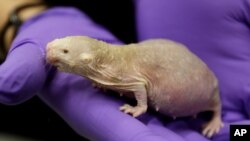Scientists at Britain’s University of Liverpool are hoping to learn more about age-related illness and cancer in humans by studying the genes of a small, burrow-dwelling rodent called a naked mole-rat that somehow is resistant to cancer.
Recent studies suggest naked mole-rat cells have anti-tumor capabilities not found in the cells of other rodents or humans. To date, no cancer has ever been detected in a naked mole-rat, which can live for more than 30 years. That lifespan is seven to eight times longer than an average mouse, which is similar in size to the naked mole-rat, yet lives for only about four years.
The University of Liverpool scientists recently published the first draft of the complete genome of the naked mole-rat, and say their research revealed the small mammal's DNA shares similarities with human DNA.
They say they want to use the new findings to gain a better understanding of the naked mole-rat's longevity, and its resistance to chronic diseases associated with aging, particularly cancer.
The naked mole-rat is native to the deserts of East Africa. It has no sensation of pain in its skin, and a low metabolic rate allows the tiny rodent species to thrive underground despite a limited oxygen supply.
Scientists Study Cancer-Resistant Rat For Clues on Cancer Cure




